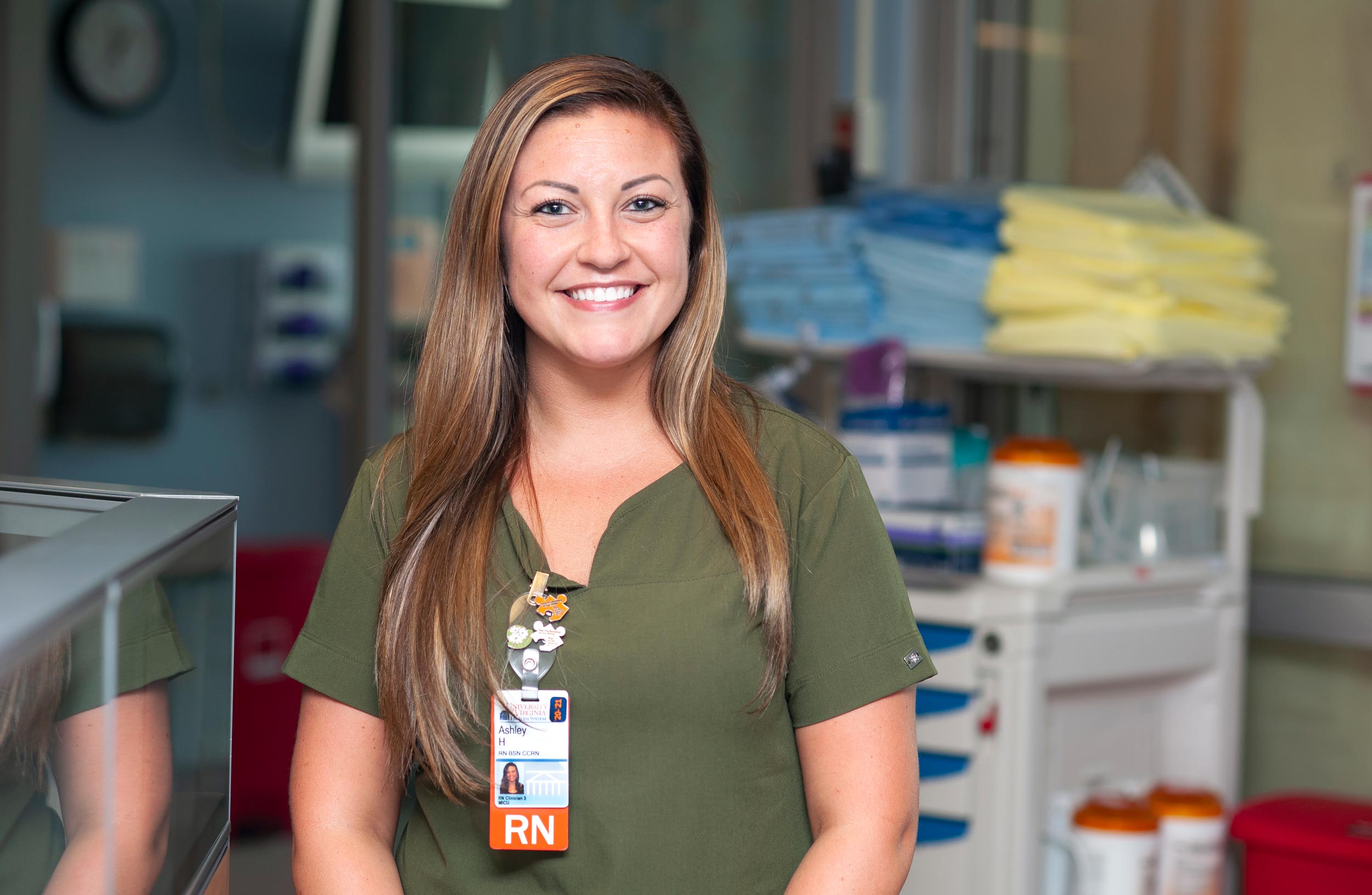These stories are difficult to hear. They come from UVA Health staff who cared for our community’s sickest COVID-19 patients – our parents, relatives, friends, neighbors. They did all they could to save lives, and for some, were there during their last hours.
Weary and emotionally scarred, these nurses and nurse assistants are forever changed, but hopeful. And like heroes on the battlefield, they come away with a profound sense of camaraderie.
“The dedication, compassion, resilience and power of this team was demonstrated in the face of exhaustion, fear, and the unknown, each and every day and night – along with an environment of constant change and stretched resources,” says Kris Blackstone, assistant nurse manager for UVA Health’s Medical Intensive Care Unit and Special Pathogens Unit, the front lines of the pandemic.
As part of their healing, these UVA Health caregivers want to share their stories. Here is the first of a five-part series of firsthand accounts.
Ashley Harlow, nurse, Medical Intensive Care Unit
In our profession, we’re used to constant change. But the pandemic was a different type of change. We were learning about COVID at the same time that we were implementing these changes.
At first, we weren’t using N95 masks for most patients. We were wearing regular masks. With our first three or four patients, our respiratory therapist and I got COVID within a day of one another.
It was so early in COVID, we were just learning that loss of taste and smell was a new symptom. I was driving into work and noticed I couldn’t taste my coffee, so I called in and was told I should go get tested for COVID. My symptoms were mild, but I had COVID for 17 days.
Losing My Grandmother to COVID
I continued to work with COVID patients throughout the year. I can’t really speak to the past six months, because I stopped working on the COVID unit. My grandmother passed from COVID in December after I had been working with those patients for almost a year.
Since then I’ve only been working on our MICU (medical intensive care unit) side. It is definitely an added challenge and emotions toward COVID itself. My managers have been really understanding that I am not ready to care for COVID patients again.
One of the other nurses sitting here with me today, Dorrie MacGregor, actually cared for my grandmother. I was able to communicate with my colleagues. I knew that she was getting the best care possible from the best team that I’ve worked with for the past five years at UVA.
Knowing so much about COVID is both a blessing and a curse because you know exactly what the most likely trajectory is going to be. My grandmother had been diagnosed with [chronic obstructive pulmonary disorder] two months prior. It was very early in her disease, but I also knew she had already been struggling with breathing. If COVID patients end up intubated [needing a breathing tube] and have an underlying lung disease, they have a lower chance of coming off the breathing tube and surviving.
She was on quite a bit of oxygen for 10 days. She was on as much oxygen as we could possibly provide without inserting the breathing tube. But then her body tired out. Her heart went into a rhythm that we commonly see with COVID, called A-fib with RVR [a very fast and irregular heartbeat]. She became acutely hypoxic [not enough oxygen in her blood to sustain bodily functions] and needed to be intubated. From there, she survived not even 24 hours.
Being on the Other Side of Facetime
We watched her pass away through Facetime. That was definitely a unique experience because I’ve been the one Facetiming family as their loved one is passing. So being on the other side of that was definitely eye-opening, humbling and challenging. But I knew the nurse who was caring for her at the end of life, which brought me some comfort. And I knew my grandmother was as comfortable as possible.
My grandmother was kind, genuine, sweet and very giving. She loved Christmas and it was difficult as she spent most of December in the COVID ICU before she passed. I was able to decorate a Christmas tree that she kept in her hospital room the whole time. It really meant a lot to her and lifted her spirits.
Morally Distressing for My Co-Workers
With my grandmother’s passing, it was very challenging for the team as well. I have co-workers that I’ve worked with for a while. I know it was definitely morally distressing and just distressing overall to take care of a team member’s family member, because you also get emotionally invested.
I have not addressed going back to the COVID unit. For my mental health, I knew I couldn’t go back over there. But I still have a lot of internal conflict, because it is like going to battle with your people, and I feel like I’m not supporting my people.
I did graduate with my master’s to become a nurse practitioner, so I’m leaving UVA at the end of July to start practicing as an NP. It was a very challenging year, especially with grad school in the midst of it. 2020 was rock-bottom, but despite that, I honestly couldn’t have asked to have a better team.
Next, read about nurse Kendall Barger's experience on the COVID unit, including excerpts from a journal she started to chronicle the pandemic.
Media Contact
Article Information
July 16, 2021
/content/front-lines-voices-covid-unit

